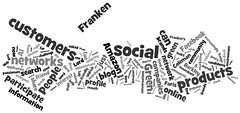"Whoa! What do you mean "so that fans could tag pictures in the fan page?" was probably one of the hardest things to explain in my recent campaign. For most of the people doing online marketing it's down to this: meeting clients, development of the strategy, recommendation on what is wrong now, approval by the client, and execution. Right?

Yeah, well, when you're trying to do something like this with a company that has been around for over half a century and has never before seen or heard of such miracle by the name of "social media" (these words still provoke a hard-to-digest thoughts in the CEO), things get stuck by step 1: meeting.
Meeting the clients is the scariest thing ever! Okay, not exactly, but I bet ya, you'll sweat your cheeks off.
When I was about to present my first strategy mock-up I was excited. I felt like I'll be stopped at every word and asked how much would that bring back, why this should be done with that-much-money... you get the idea. Instead, the first question I got was why, for crying out loud, was there a site who has a blue pigeon for a logo, in my "investments" column. I was stunned. I said "What? You mean Twitter?"
They didn't know what Twitter was. That was bullet-point number one in my presentation, so if they didn't know that was - I was about to face the longest and most painful presentation in my life; and boy, was I right.
After I had explained the basics of micro-blogging, I was able to go ahead and present a carefully created chart of different social media tools that complete one another - I'd like to call it The Social Media Flow. You know, how Twitter links to the blog that links to the site that shows the product that the customer can ask about in the comments section or see more in the video module, or interact with the company in the fan page or receive newsletters, and so on, and so forth. Managers' looks were blank. They were all thinking "What the heck is he talking about?".
When I opened the floor for questions the first one was: "Can we do it for free?", followed by "It's worse than TV spots, how would you know who read what we posted?"
Cut scene here, you can't imagine my painful and long explanation of each website (that's how they addressed the tools). After we shook hands with the managers, fully in doubt of my witchcraft, I was ready to get started with the development stage.
When the CEO doesn't know what a Facebook fan page update is, how can you make them see the big picture?
It's really hard to develop a plan if your customers don't know the first thing abut social media. Every marketer has his or her own "formula" on how to proceed with a client that has never been exposed to social media. But the difference between yet-another client and whoa-what-in-heaven's-name-is-that-thing client is that the former gives you directions, whereas the latter gives you vague hints.
It's like playing Marco Polo in a pool: They're Marco, you're Polo and the pool is Internet - you're both surrounded by it, but in order to get the right directions they have to find you first.

What I've learned in such situations is that the most profitable solution here (where profitable is a measure of time) is to go ahead and take the first "big" decisions by yourself. By big, I mean this: When I started the fan page in Facebook I asked the CEO about every single update I was about to publish. Here's what happens, this company is in a very specific niche of the entertainment industry and updates that concern it don't come up very often so whoever is posting them has to focus on external things (like posts about stuff related to but outside the company). For example when I first wanted to post an update about the upcoming art show of a local artist, it took the CEO about 10 hours to come up with a final decision. Why? Because he was unable to see the link between this event and his company.
I said that I would be materially responsible if any "scandal" (as he put it) grows out of such "news segments" (that's his definition of a "fan page update") and that I would report the final numbers of increase or decrease in fans and page views of their home page, I only wanted him to back off for a short period of time. Reluctantly, he said OK.
Of course, you're quite aware that such updates, circling around the field of interest of your fans are very rewarding - the number of new fans increased in a geometric progression every month for about 3 months. Fans were interacting with "Like"s and comments and the CEO was happy "it all worked out" as I said.
For the first detailed report, I was armed with Google Analytics print-outs, fan page "Insights" statistics, and some supporting materials that unanimously showed a great increase of interest by "the people of Internet" (that's another definition by the company's management).
The Big Bang - the company has a show to make and it uses internet to invite people
As I said earlier, this company is in the show biz and its main income comes from making shows. However, the real test for me was when they set up a open-doors event with no advertising except for some banners (about 1,000) and internet. To make that even more interesting they said my advertising budget is 0 (zero). That was 23 days before the show. I was furious! I was so mad I said I quit. Then I thought, you know what, I'll do it, if you let me do it my way. That means, my rules, no "can I post that, Mr. CEO" and so on.
I relied solely on the company's web site, the fan page and, videos of previous shows (that's YouTube), and a local social bookmarking web site.
What follows was The Social Media Flow: Daily updates were reminding fans of the free show, the videos were a graphic proof of how cool this free show was going to be, the company's user in the local social bookmarking site was so active, its friends naturally grew by over 200% and read every bookmark it posted, and the company's website promised great surprises for those who show up.

The result of all these was that over 50% of the people who showed up had to stay outside because there was no room. The theater's staff closed the doors, literally in their faces, and people started yelling "Let us in!"
The next day I changed the index of the corporate website with a message to both people that saw the show, and those who couldn't. I said we were charmed by the warm and cheering audience and that the show went million times better than what we had expected. On the other hand, those who couldn't come were free to enroll for a "small" surprise (they had a form with name and e-mail to fill out). The "small" surprise was a free ticket for the following paid show. That worked out even better.
This is how my first big campaign ended. It was hard. But it was fun. Now that I had gained the management's trust I was free to experiment and that felt good.
Join me next time for some more on how to make an old-school boring company into a 21st century socially responsible and active one!
Best of luck and feel free to post comments and questions!
Phil
Posted via web from philbg's posterous






![Reblog this post [with Zemanta]](http://img.zemanta.com/reblog_e.png?x-id=637f1263-5a12-4ab2-b688-e1c63203e790)









